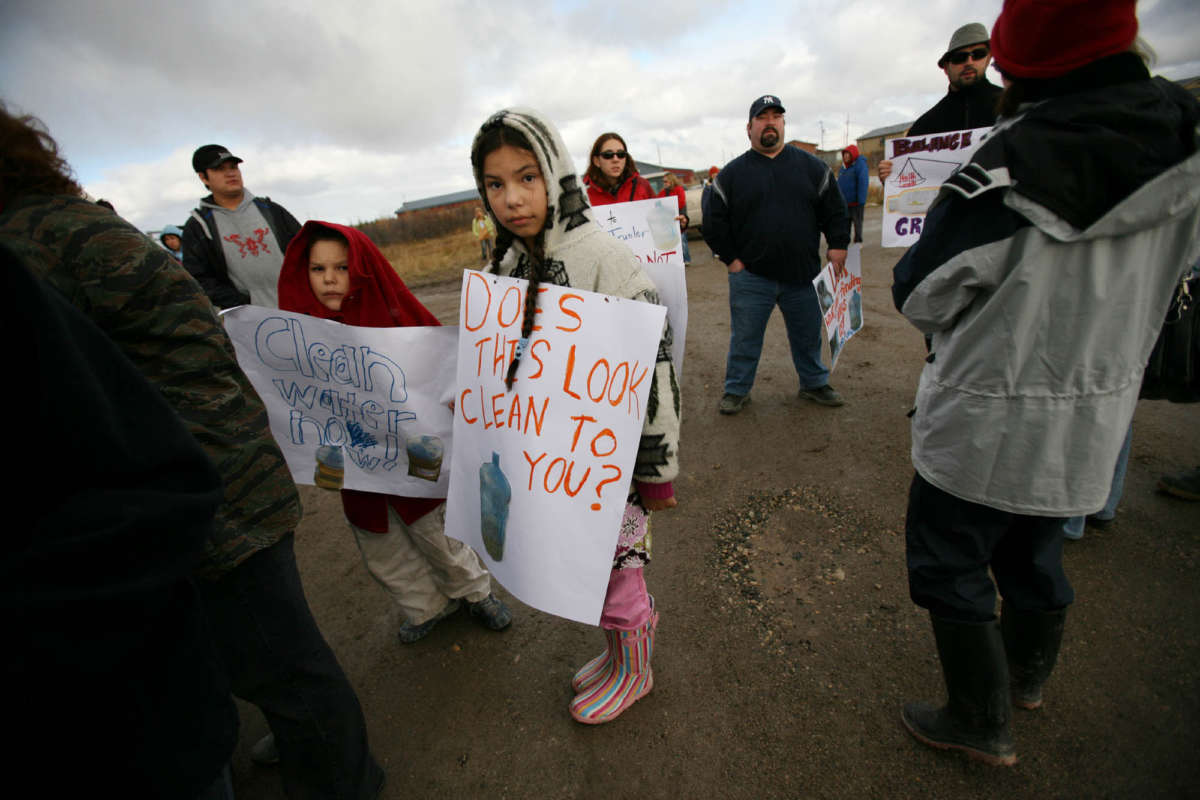This story was originally published by Grist. You can subscribe to its weekly newsletter here.
For years, First Nations in Canada have been denied access to clean drinking water. Many Indigenous communities have to deal with brown, sludgy water and the destructive health impacts it brought. Some have spent years relying on boiled or bottled water. As of March 8, 2022, there were 23 short-term drinking water advisories in place across the country, that range from boil water advisories to Do Not Consume notices. Now, the Canadian government will have to pay for it.
This week, individuals and First Nations impacted by dirty drinking water can file claims through the First Nations Drinking Water Settlement; a historic $8 billion (CAD) settlement ($6.2 billion U.S.) approved by Canadian courts in December. Triggered by class action lawsuits filed by the Tataskweyak Cree Nation, Curve Lake First Nation, and Neskantaga First Nation, the settlement could provide compensation to more than 250 First Nations and roughly 142,000 individual Indigenous people. First Nations and individuals subject to a drinking water advisory that lasted at least one year between 1995 and 2021, are eligible to file claims online and receive compensation from the settlement fund.
The settlement comes amid a long, and ongoing, history of unsafe drinking water in Indigenous communities across Canada. In 2015, a study conducted by the government found 105 long-term drinking water advisories in effect in 67 communities. Since 2015, 128 long-term drinking water advisories have been lifted, but as of February of this year, 36 long-term advisories in 29 different Indigenous communities remain in effect. Impacted First Nations will receive at least $500,000 and have up to December to file claims. Individuals must file claims by March of next year.
After the settlement was announced, Tataskweyak Cree Nation Chief Doreen Spence told the CBC, “This is a historic moment for Tataskweyak Cree Nation and First Nations across the country. First Nations will now be able to work with Canada in a more meaningful way, and have access to water standards on reserve that have never existed before. We look forward to seeing the day where all First Nations have access to safe water, now and forever.”
In the US, Indigenous communities have also faced a generations-long struggle to access safe drinking water. According to the US Water Alliance, Indigenous people are less likely to have plumbing in their homes and have access to clean drinking water than any other group in the country. Although various state and federal infrastructure projects have included funding for Indigenous water infrastructure, there has never been a settlement on par with the First Nations Drinking Water Settlement.
In addition to $1.8 billion set aside for direct compensation, the settlement includes $6 billion to fund water infrastructure projects in First Nations communities. The settlement also creates a First Nations Advisory Committee on Safe Drinking Water and commits to helping First Nations develop their own clean water legislation.
The settlement comes in the wake of the Canadian government announcing $40 billion (CAD) ($31.5 billion USD) to compensate residential school survivors and to improve social services for Indigenous children.
Join us in defending the truth before it’s too late
The future of independent journalism is uncertain, and the consequences of losing it are too grave to ignore. To ensure Truthout remains safe, strong, and free, we need to raise $43,000 in the next 6 days. Every dollar raised goes directly toward the costs of producing news you can trust.
Please give what you can — because by supporting us with a tax-deductible donation, you’re not just preserving a source of news, you’re helping to safeguard what’s left of our democracy.
